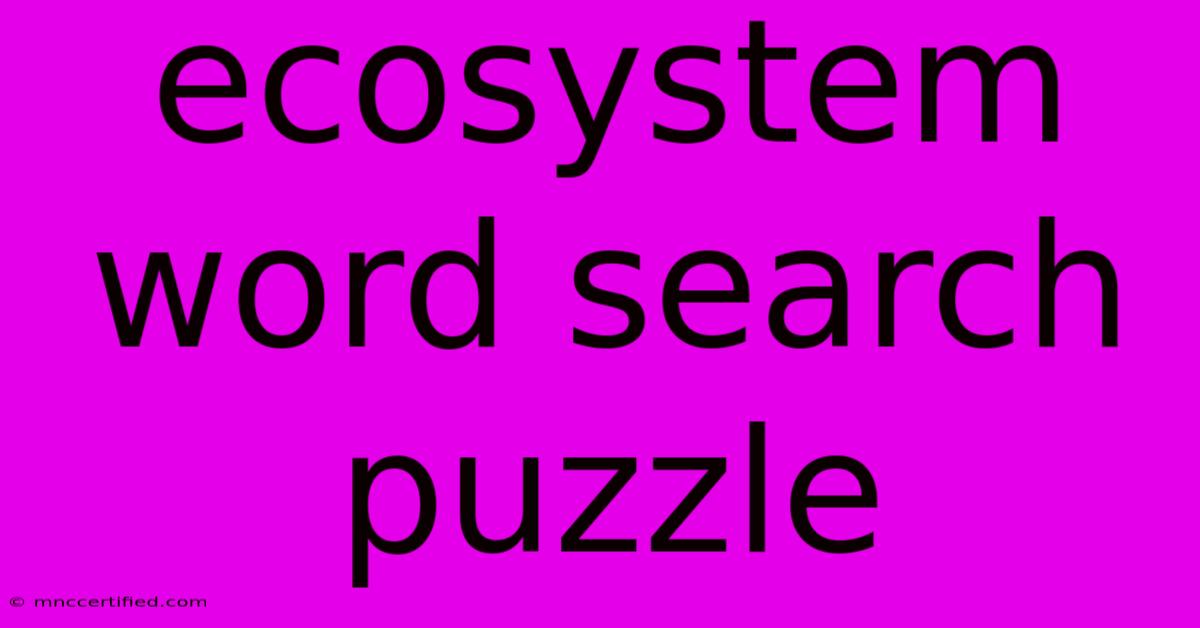Ecosystem Word Search Puzzle

Table of Contents
Ecosystem Word Search Puzzle: A Fun Way to Learn About Nature
Are you looking for an engaging and educational activity that combines fun with learning about the environment? Look no further than an ecosystem word search puzzle! This exciting activity is perfect for students, teachers, environmental enthusiasts, or anyone wanting to expand their knowledge of ecosystems in a playful way. This article will explore the benefits of using word search puzzles to learn about ecosystems, provide tips for creating your own, and offer resources to find pre-made puzzles.
What is an Ecosystem Word Search Puzzle?
An ecosystem word search puzzle is a word puzzle where words related to ecosystems are hidden within a grid of letters. Players must locate and circle these words, testing their knowledge and vocabulary related to environmental science. This can include terms like producer, consumer, decomposer, biotic factors, abiotic factors, habitat, niche, symbiosis, biodiversity, and many more, depending on the complexity and focus of the puzzle.
Why Use Ecosystem Word Search Puzzles?
Word search puzzles offer a unique blend of entertainment and education, making learning about ecosystems fun and accessible. Here's why they are a great tool:
- Engaging Learning: They make learning active and enjoyable, catering to different learning styles.
- Vocabulary Building: Players encounter and learn new terms related to ecosystems.
- Knowledge Reinforcement: The act of searching for words helps reinforce learned concepts.
- Improved Focus and Concentration: The puzzle requires focus and attention to detail.
- Great for All Ages: They can be adapted for different age groups and knowledge levels.
- Versatile Use: They can be used in classrooms, at home, or as part of environmental awareness campaigns.
Creating Your Own Ecosystem Word Search Puzzle
Designing your own puzzle allows for customization to specific learning objectives. Here's how:
-
Choose Your Keywords: Select a range of keywords related to ecosystems, considering the target audience's knowledge level. Include a mix of easy and challenging words. Think about specific ecosystem types you want to focus on, like marine ecosystems, forest ecosystems, or desert ecosystems. This allows you to tailor the puzzle to a specific learning goal.
-
Create the Grid: Decide on the size of your grid (e.g., 10x10, 15x15). The larger the grid, the more challenging the puzzle.
-
Place the Words: Strategically place the keywords within the grid, horizontally, vertically, diagonally, or even backward. Ensure words don't overlap excessively.
-
Fill the Remaining Spaces: Fill the remaining spaces with random letters.
-
Create an Answer Key: This is essential for checking answers.
-
Consider Visual Elements: Enhance the puzzle with images of relevant plants or animals to make it visually appealing.
There are many online word search puzzle generators available that can automate this process. Search for "word search puzzle generator" to find one that suits your needs.
Finding Pre-Made Ecosystem Word Search Puzzles
If creating your own puzzle seems daunting, many pre-made puzzles are available online and in educational resources. Search online using terms like:
- "Ecosystem word search puzzle printable"
- "Free ecosystem word search"
- "Printable word search puzzles for kids about nature"
- "Biology word search puzzles ecosystems"
Beyond the Puzzle: Expanding Your Ecosystem Knowledge
Using the word search as a starting point, you can further explore ecosystem concepts. After completing the puzzle, consider these activities:
- Research the words: Look up the definitions of unfamiliar words and research their roles within ecosystems.
- Diagram an ecosystem: Create a diagram showcasing the interactions between different organisms within an ecosystem.
- Discuss environmental issues: Discuss human impacts on ecosystems and potential solutions.
- Explore local ecosystems: Go on a nature walk and identify organisms in your local ecosystem.
By incorporating word search puzzles into your learning or teaching strategies, you can create a fun and effective way to explore the fascinating world of ecosystems and promote environmental awareness. Remember to tailor the difficulty and content to your audience, making it an engaging and enriching experience for everyone.

Thank you for visiting our website wich cover about Ecosystem Word Search Puzzle. We hope the information provided has been useful to you. Feel free to contact us if you have any questions or need further assistance. See you next time and dont miss to bookmark.
Featured Posts
-
Watch Wisconsin Vs Minnesota Football Online
Nov 30, 2024
-
Aleppo Rebels Control Majority
Nov 30, 2024
-
Can Insurance Cover Nose Job
Nov 30, 2024
-
Classic Car Insurance Nevada
Nov 30, 2024
-
Best Air Pods Black Friday Sales 2024
Nov 30, 2024